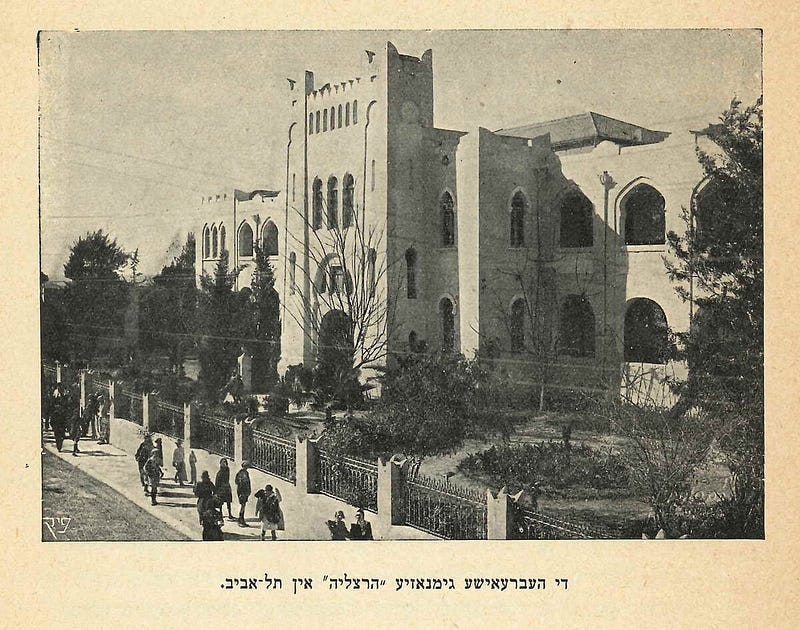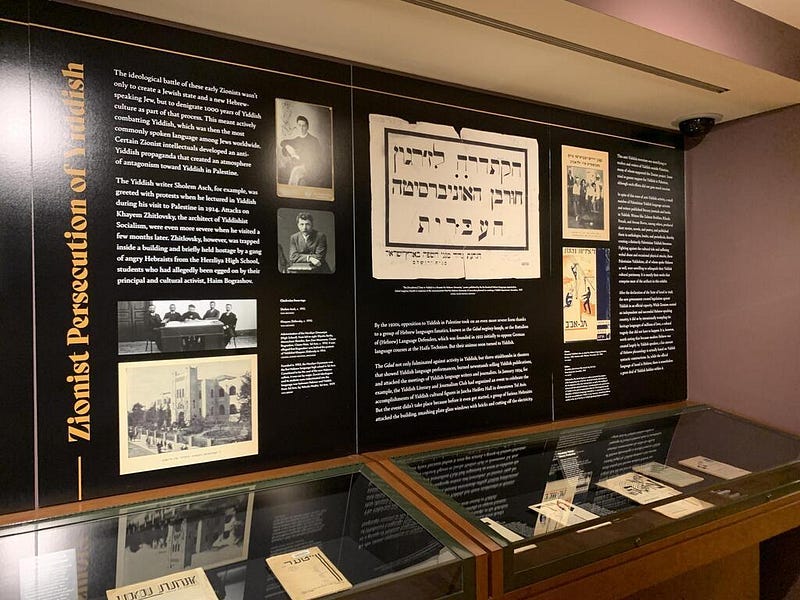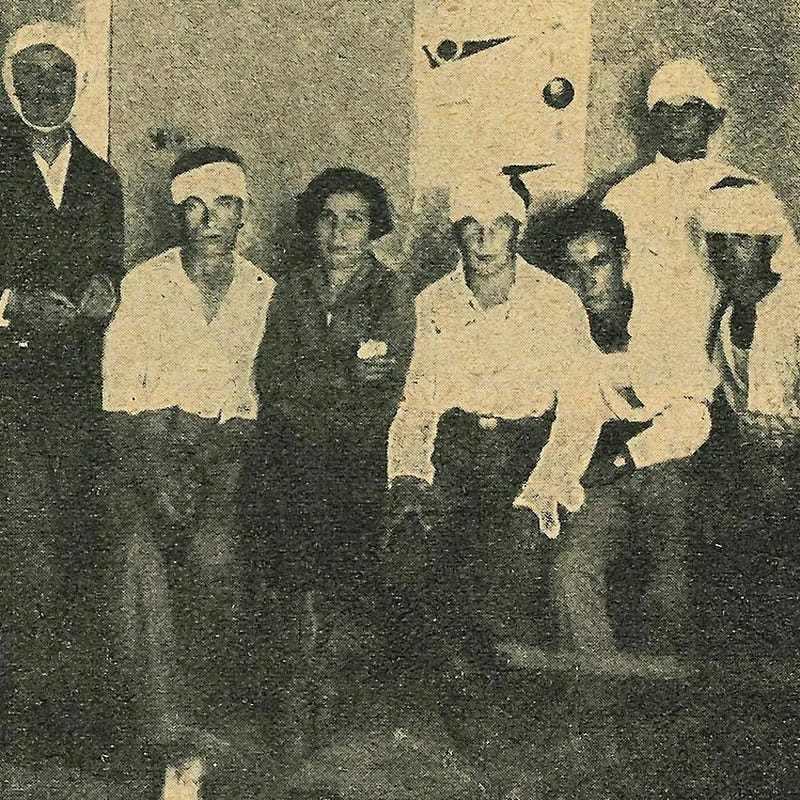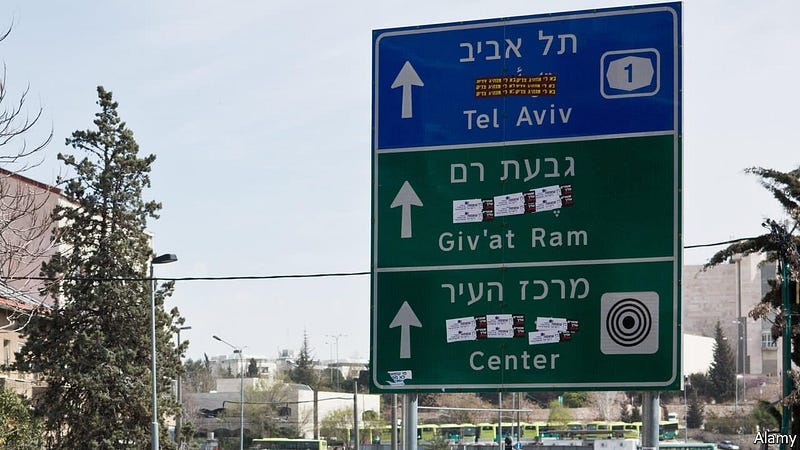Israel Was Built on Myth, Part II: Modern Hebrew is a Made-Up Language
The official language of the State of Israel is an artificial invention that did not even exist before 1922.
Note: This is a follow-on article to my original post:
The secular (even atheist) Zionist founders of Israel did not want the Jewish religion to be the cultural unifier for the new nation. Rather, they wanted the Hebrew language to be the foundation for Israeli society.
The only problem? Spoken Hebrew did not exist as a language.
In fact, spoken Hebrew became extinct as a language around 200 A.D. (CE) and modern Hebrew, the official language of Israel, is an artificial construct that did not exist before 1922.
“[Hebrew] was supplanted by Western Aramaic, a dialect of the Aramaic language, the local or dominant languages of the regions Jews migrated to, and later Judeo-Arabic, Judaeo-Spanish, Yiddish, and other Jewish languages. Although Hebrew continued to be used for Jewish liturgy…it became extinct as a spoken language.”
The revival of Hebrew as a spoken language is mostly due to the travails of one committed Lithuanian Zionist named Eliezer Ben-Yehuda. Like most early Zionists, Ben-Yahuda was a secular Jew who did not practice Judaism, but rather saw Zionism as a way to “embrace Hebrew without religion.”

Ben-Yahuda came to Palestine with the First Alliyah and began his project to revive the Hebrew language:
“Arriving in Jerusalem in 1881, Ben-Yehuda immediately put his plan of Hebrew revival into action. He left behind his birth name and with his wife, Deborah Jonas, he created the first Modern Hebrew-speaking household. He also raised the first modern Hebrew-speaking child, Ben-Zion Ben-Yehuda.”
Of course, due to centuries of extinction, the Hebrew language had to be more created than revived. Ben-Yahuda had to invent many words that did not exist in the sacred texts of Judaism. For example, he came up with Hebrew words for objects such as eggplant (aubergine), tomato and maize (corn), as well as things like electricity.
In the land of the famous Jaffa oranges, Ben-Yahuda had to invent a Hebrew word for “orange”!

The enterprising young Zionist met resistance, however, from the local Jewish community. The religious ultra-Orthodox Jews living in Jerusalem, for whom Hebrew was used only for holy purposes such as studying Torah, realised Ben-Yahuda’s secular-nationalist intentions, and rejected him and his language, declaring a herem, excommunicating Ben-Yehuda.
That did not deter him, however, and he and his Zionist comrades eventually convinced the British Mandate Authority to officially recognise Hebrew as an official language in Palestine in 1922.

Ben-Yahuda’s cause became that of other Zionists like Menachem Begin and David Ben Gurion, a fellow atheist who rejected the Jewish religion as a national unifying force, declaring instead that “the cultural binding of the Zionist society must be the Hebrew language” — i.e., NOT Judaism.
This is why Yiddish is “forbidden” in Israel
If the secular Zionists wanted the Hebrew language to be a cultural unifier, then they needed to defend it jealously and promote it zealously. This meant they had to wipe out all traces of “non-Semitic” Jewish languages like Yiddish, which had long and deep roots in Eastern and Central Europe.
Worse yet, the Jewish scholar Abraham Harkavy, in his 1867 book, The Jews and Slavic Languages (Ha-Yehudim u-Sefat ha-Slavi), posited that the Yiddish language, spoken by the Ashkenazi Jews, came from the Khazars.
To put it bluntly: the speaking of Yiddish and the very existence of Yiddish-speaking Jews was “proof” that the Ashkenazi Jews were descended from the Turkic Khazars and not from the ancient Hebrews.

It is no wonder, then, that Yiddish was practically banned in Israel. All Jews must learn Hebrew. David Ben Gurion, who saw Hebrew as being integral to the cohesion of the Israeli state, condemned Yiddish as “a grating, foreign language“.
Think about this: Yiddish was Ben-Gurion’s first language. That is how devoted a Zionist he was.
In fact, he and the other Yiddish-speaking Ashkenazi Zionists who founded the State of Israel made “anti-Yiddishism” the official Israeli government policy.

The “War of the Languages”
But even before the founding of the Israeli state, those who spoke Yiddish in Palestine were attacked and beaten up by Zionist Jews. The Zionists were trying to make Hebrew — and ONLY Hebrew — the official language of Israel.
As Rabbi Eli Kavon wrote in the Jerusalem Post , the Zionists actually “feared Yiddish”, and — according to Kavon — that fear, and the resulting “assault on Yiddish” that the Israeli state mounted for decades, “was, in some ways, necessary.”
This was because, as Kavon explains, “Yiddish was not a “jargon” or a “dialect” — it was a powerhouse that could have undermined the Zionist project.”
In fact, Kavon openly declares that “Zionists struggled with the claim to Jewish authenticity.”
This struggle for authenticity by the Zionists led to an actual “War of Languages” that pitted Yiddish-speaking, religious and traditional Jews against secular, Hebrew-speaking Zionist intellectuals.
Yiddish in prestate Palestine and in Israel does not end there. Groups arose in the 1920s in Tel Aviv that were committed to repressing any attempts by olim from the Pale of Settlement to speak in Yiddish or conduct any activities in the language. The Battalion of the Defenders of the Language used “hooligan tactics” to interrupt lectures in Yiddish and to close down the offices of Yiddish publications.

For the atheistic Zionists, Hebrew, not Judaism, would be the cultural glue to hold together the State of Israel.
Yiddish is once more “verboten”
While Yiddish language learning, newspapers, TV and radio stations were banned in the 1950’s, the Yiddish language enjoyed a bit of a comeback in the 1980’s, when there was a general revival of Yiddish in Europe and the United States.
That newfound tolerance for Yiddish in Israel, however, was quashed in 2018, when the Israeli Knesset passed its “nation-state law”, which established Hebrew as Israel’s official language, and downgraded Arabic — a language widely spoken by Arab Israelis — to a “special status.”
The War of Languages was raging again, only this time it was Hebrew versus Arabic, and for the Zionists, there was again no place for a non-Hebrew Jewish language in Israel.
Reinforcing Zionism: The Great Re-Naming
Once the Zionists had managed to make Hebrew an officially recognised language (1922) and even founded a Hebrew-language high school (1929) they knew that their claim to the land of Palestine, their justification for robbing that land from the indigenous Palestinians, would rely an the “linguistic legitimacy” that Kavon mentions.
That meant two things:
(1) They had to change their own names from the European names they were born with to something that sounded legitimately Hebrew;
(2) They needed to change the place names of the towns, villages and regions they wanted to settle from the Arabic names they had held for centuries, replacing them with Hebrew names.
This is why Israelis have to change their names
In order to create a narrative and a sort of Hebrew, Semitic mystique, Ashkenazi Israelis who have European family names are encouraged to give themselves Hebrew names.
The Jewish Agency for Israel (originally the Jewish Agency for Palestine) even came up with an official guide with rules as to how to take a European name and “Hebraicise” or “Judaise” it. Here is an excerpt:
Changing a foreign surname to Hebrew
Change of vocalisation: “Leib” becomes Lev
Change of consonants: “Borg” becomes “Barak”
Shortening by omitting the ending: “Rosenberg” becomes “Rosen”
Shortening a name with a Hebrew meaning, by omitting the foreign suffix: “Yakobovitch” (Jacobowitz, Jacobowicz) becomes “Ya’acobi”
Translating the foreign name into Hebrew according to the meaning: “Abramovich” (Abramowicz, Abramowitz) becomes “Ben Avraham”
Eliezer Ben-Yehuda, the “inventor” of modern Hebrew, was one of the first to undergo such Hebraisation. He was actually born Eliezer Yitzhak Perlman. But many others followed.
For example, David Ben-Gurion, Israel’s “founding father”, was actually named David Grün. Moshe Sharett was born Moshe Chertok, Levi Eshkol was born Levi Shkolnik, Yigal Allon was born Yigal Peikowitz. Golda Meir was born Golda Mabovitch, and Yitzhak Rabin’s father’s last name was originally Rubitzov.
Benjamin Netanyahu’s real last name is Mileikowsky (his father started using Netanyahu when he emigrated from Poland). Still, Bibi’s made-up name did not stop him from using his fake Hebrew name to impress an “easily dupable” American audience:
In a speech to AIPAC in 2010, Netanyahu shocked delegates with an incredible announcement:
“In my office, I have a signet ring that was loaned to me by Israel’s Department of Antiquities. The ring was found next to the Western wall, but it dates back some 2,800 years ago, two hundred years after King David turned Jerusalem into our capital city.
The ring is a seal of a Jewish official, and inscribed on it in Hebrew is his name: Netanyahu. Netanyahu Ben-Yoash. That’s my last name”.

Here is a listing of the Prime Ministers of Israel, with their real names and places of origin:
David Ben Gurion, (né David Gruen) — POLAND
Moshe Charet (né Chertok) — RUSSIAN (Kherson)
Levi Eshkol (né Shkolnik) — RUSSIAN (Kiev)
Yigal Allon (né Peikowitz — RUSSIAN (Belarus)
Golda Meir — (né Mabovitch) — RUSSIAN (Kiev)
Yitzhak Rabin — (né Rubitzov) — RUSSIAN (Ukraine)
Menachem Begin — RUSSIAN (Belarus)
Yitzhak Shamir (né Yezernitsky) — POLAND
Shimon Peres (né Perski) — POLAND
Ehud Barak (né Brog) — RUSSIAN (Lithuania)
Ariel Sharon — (né Scheinerman) — GEORGIA
Ehud Olmert — RUSSIAN
Naftali Bennet (né Salomonson) — POLAND
Yair Lapid (né Lampel) — SERBIA
Benjamin Netanyahu (né Mileikowsky) — POLAND
Zionists had to invent new PLACE NAMES as well
Modern Hebraisation efforts for place names began from the time in the First Aliyah in 1880. These names, however, were applied only to sites purchased by the Jewish National Fund (JNF), as they had no sway over the names of other sites in Palestine. That would come later.

In late 1949, after the Zionist “War of Independence”, the new Israeli government created the Committee for the Designation of Place-Names in the Negev Region, a group of nine scholars whose job was to assign Hebrew names to towns, mountains, valleys, springs, roads, etc., in the Negev region.
Prime Minister David Ben-Gurion, ever insistent on the importance of the Hebrew language to lend legitimacy to the Zionist claims on the land of Palestine, wrote in his diary: “We must give Hebrew names to these places — ancient names, if there are, and if not, new ones!”
He charged the committee thusly:
“We are obliged to remove the Arabic names for reasons of state. Just as we do not recognise the Arabs’ political proprietorship of the land, so also do we not recognise their spiritual proprietorship and their names.”
In the Negev, 333 of the 533 new names which the committee decided upon were transliterations of, or otherwise similar-sounding to, the Arabic names.
Like the Jaffa oranges, the Zionists were expropriating EVERYTHING from the Palestinians — even the names of their towns.

Re-naming a “vital issue”
In March 1951, the Israelis formed a national survey and re-naming committee to cover all of Israel. The new merged committee stated their belief that the “Judaisation of the geographical names in our country [is] a vital issue”.
In February 1960 the director of the Survey of Israel, Yosef Elster, wrote that “We have ascertained that the replacement of Arabic names with Hebrew ones is not yet complete. The committee must quickly fill in what is missing, especially the names of ruins.”
The Zionists needed to “own the past” in order to fabricate their own fake present.
As explained in Wikipedia:
“Between 1920 and 1990, the different committees had set Hebrew names for some 7,000 natural elements in the country, of which more than 5,000 were geographical place-names, several hundred were names of historical sites, and over a thousand were names given to new settlements.”
Sometimes the committee translated the Arabic name into Hebrew. At other times the committee distorted Arabic names and replaced them with Hebrew names that were similar in form or sound.

Cultural erasure of Palestinians through re-naming
As Israel became more and more of a right wing, fanatical Zionist project, the move towards cutural erasure of Palestinian identity came to focus on re-naming everything everywhere, even in the Occupied Territories.
In 2009, Israel’s Likud fanatical Zionist Minister of Transport, Israel Katz, announced that all road signs would be Hebraised:
Under the new scheme, the Arab identity of important Palestinian communities will be obscured: Jerusalem, or “al-Quds” in Arabic, will be Hebraised to “Yerushalayim”; Nazareth, or “al-Nasra” in Arabic, the city of Jesus’s childhood, will become “Natzrat”; and Jaffa, the port city after which Palestine’s oranges were named, will be “Yafo.”

Umar Al-Ghubari, a Palestinian journalist and political educator, wrote about the name-changing on the signs:
“The signs aim to establish facts on the ground, in the language, and in the mind. We Palestinians pass impotently by the signs stuck in our country. The Jerusalem signs — and other signs throughout the country — stand remonstratively in our faces all the time. They are always there so as to embody and remind us of our defeat. They’re there to hurt. One can’t evade them. We’re attacked and besieged by these Judaised signs.”
He added:
“This is how the State of Israel has created an ongoing Nakba, which includes a linguistic Nakba.”
I am sure that David Ben-Gurion is smiling up at him.
#End
If you liked this post, please consider leaving me a tip! Donations support my independent, ad-free writing.
============================================================================







Alex Stein is clearly triggered.
I find it amusing that he says the names were European as a "result of a sort of internal colonialism"... colonialism being shitty as we all agree... nearly there Alex! Follow that thought!
Everyone should read and learn a lot from this well-researched article.